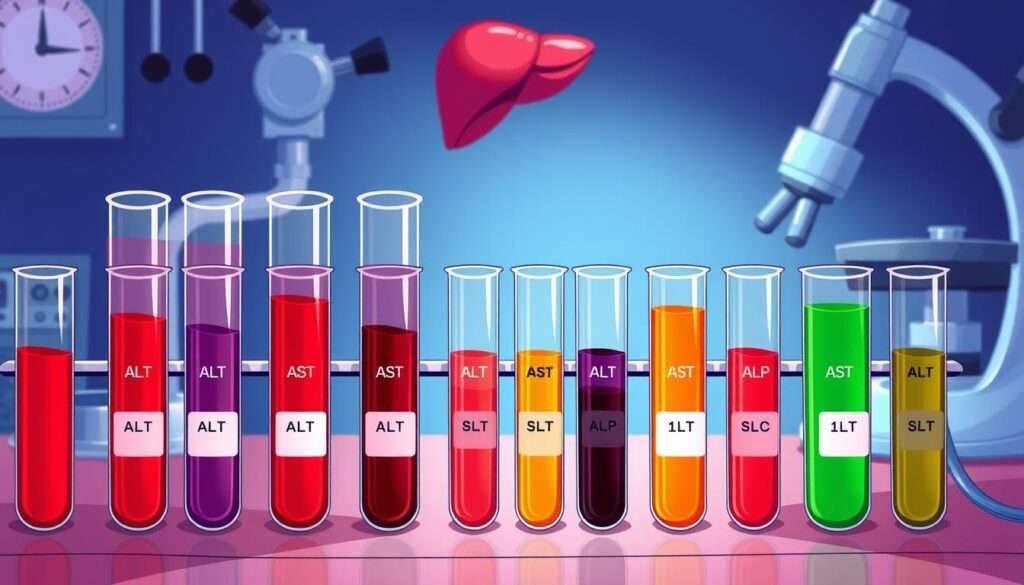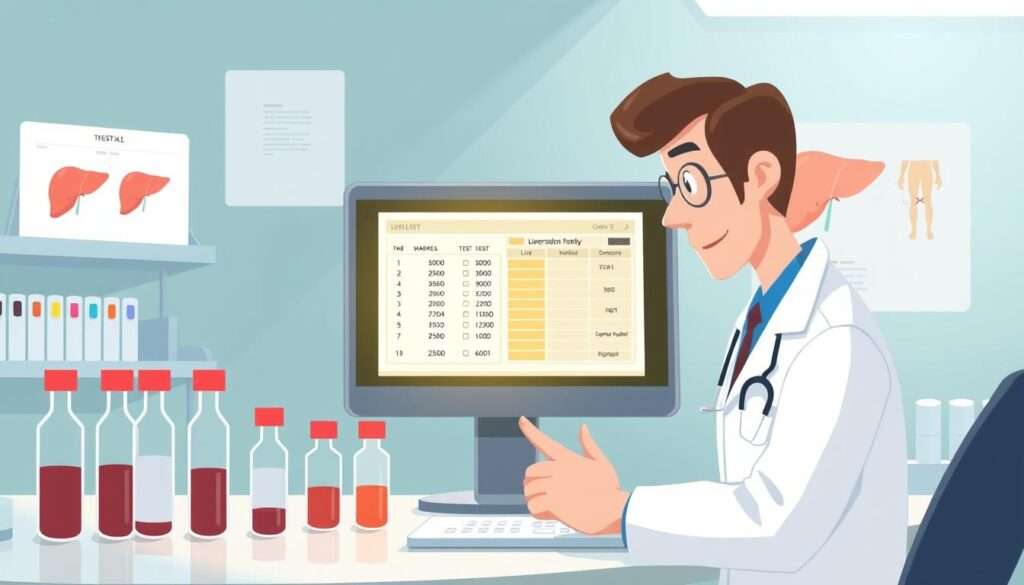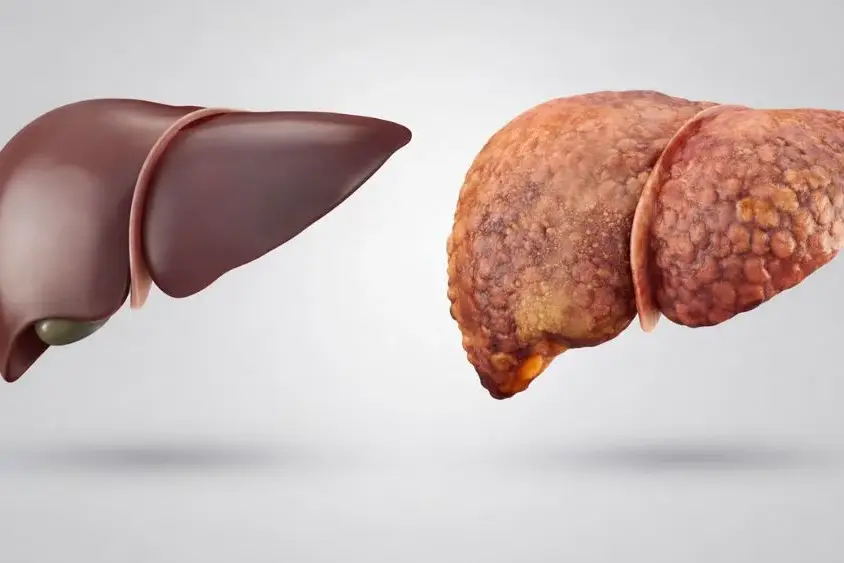Keeping your liver healthy is very important. It does over 500 important jobs in your body. A liver function test checks how well your liver is working.
Table of Contents
ToggleThis test looks at your blood for enzymes, proteins, and more. It shows if your liver is healthy or not.
Knowing how much a liver function test costs is important. It helps you take care of your liver. We’ll talk about what the test includes, why it’s important, and how to understand your results.
We’ll also discuss the cost of liver function tests. Plus, we’ll give tips on getting ready for the test and keeping an eye on your liver’s health.
Introduction to Liver Profile Tests
Your liver is very important. It does over 500 key things for your body. Doctors often suggest a liver profile test to check its health.
These tests look at substances made by your liver. They give clues about how well your liver is doing.
What are Liver Profile Tests?
A liver profile test checks your liver’s health. It looks at enzymes, proteins, and bilirubin levels. This helps see if your liver is okay.
These tests find liver damage or disease early. This means you can get help sooner.
Importance of Understanding Liver Health
Knowing about your liver health is key. Your liver filters toxins, makes proteins, and controls metabolism. By checking your liver often, you can catch problems early.
This helps keep your liver working well. It keeps you healthy overall.
Liver profile tests are for people who drink a lot, take certain meds, or show liver signs. Regular tests can spot issues before they get worse.
Components of a Liver Profile Test
A liver profile test checks many important parts to see how well your liver is working. It looks at enzymes, proteins, and waste products the liver handles.
Enzymes Measured
The test checks enzymes like AST, ALT, ALP, and GGT. High levels of these liver enzymes can mean liver damage. This helps find liver problems.
Proteins Evaluated
The test also checks liver proteins like albumin and total protein. These proteins are key for liver functions. Their levels show how well the liver is working.
Bilirubin Levels
The test looks at bilirubin levels too. This is a waste product the liver removes. High or low levels can mean liver issues.
Knowing what a liver function test checks helps understand your liver’s health. You can then work with your doctor to fix any liver problems.

Purpose of the Liver Profile Test
The liver function test, also known as the liver profile test, has many important uses. It helps find liver damage or diseases, track liver conditions, and check if medicines harm the liver. Doctors might suggest this test if you have symptoms like belly pain, losing weight without trying, or changes in skin or eyes.
It’s key to get regular liver function tests, especially if you have risk factors or liver problems. The liver panel test looks at enzymes, proteins, and bilirubin levels. This gives clues about the liver’s health and any issues.
- The liver panel test can be used for diagnosis of liver diseases and other health problems involving the liver.
- Common measures in the liver panel test include levels of Bilirubin, Albumin, Alkaline Phosphatase (ALP), Aspartate Aminotransferase (AST), and Alanine Aminotransferase (ALT).
- The results from a liver profile test can help healthcare providers assess liver function and potential underlying health issues.
Knowing why you need a liver function test helps you stay on top of your liver health. Regular tests are vital for catching and managing liver problems early.
Interpreting Liver Profile Test Results
It’s important to understand your liver test results. Each test has a normal range. By comparing your results to these ranges, you can see if your liver is working right.
Normal Range Values
Here are the normal ranges for liver tests:
- ALT (alanine aminotransferase): 7 to 55 units per liter (U/L)
- AST (aspartate aminotransferase): 8 to 48 U/L
- ALP (alkaline phosphatase): 40 to 129 U/L
- Albumin: 3.5 to 5.0 grams per deciliter (g/dL)
- Total protein: 6.3 to 7.9 g/dL
- Bilirubin: 0.1 to 1.2 milligrams per deciliter (mg/dL)
- GGT (gamma-glutamyl transferase): 8 to 61 U/L
- LD (lactate dehydrogenase): 122 to 222 U/L
- PT (prothrombin time): 9.4 to 12.5 seconds
Patterns of Abnormal Results
If your results are not normal, it might mean you have a liver problem or another health issue. Your doctor can spot patterns in abnormal results. This helps them figure out the cause, like liver disease or side effects from medicine.
Working with your doctor to understand your interpreting liver function test results is key. It helps keep your liver healthy and deals with any abnormal liver test results.
Liver Diseases and Conditions
Your liver is key to your health. But, it can face many liver diseases and liver conditions. Issues like hepatitis, cirrhosis, fatty liver disease, and liver cancer can affect it.
Knowing about these liver diseases helps you spot problems early. Working with your doctor is key to keeping your liver healthy. Early action is vital to avoid bigger problems.
- Fatigue and weakness
- Jaundice (yellowing of the skin and eyes)
- Abdominal pain or discomfort
- Nausea and vomiting
- Loss of appetite and unintentional weight loss
- Swelling in the legs or abdomen
- Dark-colored urine and pale-colored stools
If you notice these signs, get a liver profile test done. It checks your liver’s health and finds any problems quickly.
Risk Factors and Causes of Elevated Liver Enzymes
If your liver profile test shows high liver enzymes, it’s important to know why. Drinking too much alcohol and taking certain medicines are big reasons. Alcohol can harm your liver, causing problems like hepatitis and cirrhosis. Some medicines, like antibiotics and painkillers, can also damage your liver.
Alcohol Consumption
Drinking too much alcohol is a main cause of high liver enzymes. The liver tries to break down alcohol, but too much can hurt it. This can lead to inflammation and high enzyme levels. It’s key to cut down on alcohol to keep your liver healthy.
Medications and Liver Damage
Some medicines can also raise liver enzymes. Over-the-counter pain medicines, like Tylenol, are common culprits. Prescription drugs, like statins for cholesterol, can also cause problems. It’s important to talk to your doctor about any medicines you’re taking.
Knowing about these risks can help you and your doctor take care of your liver. Early action can stop more serious liver issues.

Preparing for a Liver Profile Test
To get accurate results from your liver test, you need to prepare well. Your doctor will tell you to fast for 8-12 hours before the test. This means no food, drinks (except water), and some medicines. Fasting is key to seeing how healthy your liver is.
Fasting Requirements
Fasting is important for a liver test. Your doctor will give you specific rules. Usually, you can’t eat or drink anything (except water) for 8-12 hours before the test. This helps avoid any food or drink effects on the test results.
Medication and Supplement Disclosure
Tell your doctor about all medicines, supplements, and herbs you’re taking. Some can change liver test results. Telling your doctor helps them understand your test results better and make good decisions for your liver health.
Avoiding Alcohol
Don’t drink alcohol for at least 72 hours (3 days) before the test. Alcohol can make liver enzyme levels go up, which can mess up test results. Not drinking alcohol lets your doctor see how well your liver is working.
By following these steps, you help make your liver test a success. Your doctor will have the best information to check your liver health. The Liver Profile #1 Baseline Blood Test is a detailed check that can spot liver problems and keep an eye on your health.
Follow-up Testing and Monitoring
If your first liver test shows odd results, your doctor might suggest more tests. These could include imaging studies like an ultrasound or a CT scan. They help see how your liver looks and works.
Your doctor might also ask for more blood tests. These tests check specific liver enzymes or proteins. This gives more info about your liver health.
It’s important to keep checking your liver’s function. This is true for people with liver diseases or at risk. It helps catch and manage problems early.
Additional Diagnostic Tests
Based on your first test and health, your doctor might suggest more tests. These could be:
- Liver imaging: Ultrasound, CT scan, or MRI to assess the structure and appearance of your liver
- Liver biopsy: A small sample of liver tissue is collected and examined under a microscope
- Specific blood tests: To measure specific liver enzymes, such as ALT, ALP, and GGT, or liver proteins, like albumin and globulin
- Specialized tests: For conditions like viral hepatitis, autoimmune liver diseases, or genetic disorders affecting the liver
These extra tests and checks are key. They help make sure your liver is being looked after. This is especially true if you have a liver condition or are at risk.

Liver Function Test Cost
Keeping your liver healthy is key. Regular tests help check its work. But, these tests can cost a lot, depending on many things. Knowing what these tests might cost helps you plan and choose the best for your health.
The cost of a liver function test can be between $50 and $200 without insurance. The test’s details, like the number of enzymes checked, affect the price. A full liver panel costs more than a basic test.
The liver enzyme test price and liver panel cost also depend on where you are and your insurance. Your insurance might cover some or all of the hepatic function tests fees. This can lower what you pay.
Talking to your doctor and insurance about costs is smart. Many places offer payment plans and help to make tests more affordable.
Knowing the cost of liver function test helps you make smart health choices. It lets you take care of your liver better.
Lifestyle Changes for Liver Health
Keeping your liver healthy is key for your overall health. Liver function tests show how your liver is doing. But, you can also make lifestyle changes to help your liver.
One big step is to drink less alcohol. Too much alcohol can harm your liver, causing diseases like fatty liver and cirrhosis. Try to drink less or stop drinking altogether.
Eating well is also important. Eat lots of fruits, veggies, whole grains, and lean proteins. These foods help your liver stay healthy. Stay away from processed and fried foods, as they can hurt your liver.
Being active is also good for your liver. Do a mix of cardio and strength training to help your liver. Try to exercise at least 150 minutes a week.
It’s also key to manage health issues like diabetes and obesity. These can lead to fatty liver disease. Work with your doctor to control these conditions through diet, exercise, and medicine.
By changing your lifestyle, you can help your liver stay healthy. A healthy liver is important for your overall health. So, making these changes now can help you a lot in the future.

Conclusion
Liver function tests are key for checking your liver’s health. Your liver is vital for many body functions. Knowing about these tests and their results helps you keep your liver healthy.
Going for regular check-ups and making healthy lifestyle choices can help prevent liver diseases. Taking care of your liver is important for your overall health. It’s a smart move for your future well-being.
By learning and caring for your liver, you protect this important organ. This helps it work well and keeps you healthy for a long time.
FAQ
What is a liver profile test?
A liver profile test checks your liver’s health through blood tests. It looks at substances made by your liver. This helps understand how well it’s working.
Why is understanding liver health important?
Your liver does over 500 important jobs in your body. It’s key to watch its health. These tests help doctors find liver damage or disease early. This allows for timely treatment.
What does a liver profile test measure?
A liver profile test checks liver enzymes like ALT, AST, ALP, and GGT. It also looks at liver proteins and bilirubin levels. This helps assess your liver’s health.
When do doctors order a liver profile test?
Doctors order a liver profile test to diagnose liver damage or diseases. They also use it to track a known liver condition. Or to see if medications are causing liver side effects.
How do I interpret my liver profile test results?
Your results are compared to normal ranges. If they’re outside the normal range, it might mean a liver issue. Or another health problem.
What are some common liver diseases and conditions?
Common liver issues include hepatitis, cirrhosis, fatty liver disease, and liver cancer.
What can cause elevated liver enzymes?
Excessive alcohol consumption and certain medications can cause elevated liver enzymes. This includes antibiotics, cholesterol-lowering drugs, and painkillers.
How do I prepare for a liver profile test?
Your healthcare provider will tell you to fast for 10-12 hours. Avoid alcohol for 72 hours. Also, tell them about any medications or supplements you’re taking.
What follow-up tests may be needed after an abnormal liver profile test?
After an abnormal test, you might need imaging studies. This includes an ultrasound, CT scan, or MRI. Or a liver biopsy to analyze liver tissue.
How much does a liver function test cost?
The cost of a liver function test is between to 0 without insurance. It depends on the components and your location.
How can I maintain a healthy liver?
To keep your liver healthy, reduce alcohol consumption. Eat a balanced diet. And stay active with regular physical activity.
Source Links
- Liver Profile Test: Understanding Your Results And What They Mean
- Liver Function Tests: Types, Purpose, normal ranges, and Results | Max Hospital
- Exciting breakthrough in gut health: Bene Esse unveils its gut-transforming products – Times of India
- Liver Blood Test | Walk-In Lab
- Hepatic Function Panel Cost – Find Lab Tests Online
- Macromo Blood Liver Health
About The Author

Medically reviewed by Dr. Nivedita Pandey, MD, DM (Gastroenterology)
Senior Gastroenterologist & Hepatologist
Dr. Nivedita Pandey is a U.S.-trained gastroenterologist and hepatologist with extensive experience in diagnosing and treating liver diseases and gastrointestinal disorders. She specializes in liver enzyme abnormalities, fatty liver disease, hepatitis, cirrhosis, and digestive health.
All content is reviewed for medical accuracy and aligned with current clinical guidelines.
About Author | Instagram | Linkedin




